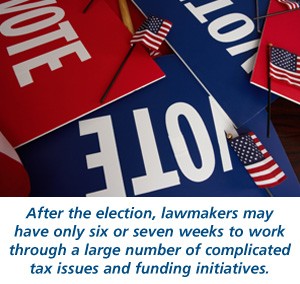Nearing the Fiscal Cliff: How Election-Year Inaction Could Affect the U.S. Economy
 In February, Federal Reserve Board Chairman Ben Bernanke coined the phrase “fiscal cliff” to warn Congress about the potentially harmful combination of nearly $600 billion in federal tax increases and spending cuts that are scheduled to take effect on January 1, 2013, unless lawmakers address the deficit, taxes, and government spending. Economists and government officials have expressed concern that failing to prevent such severe fiscal tightening at the start of the year could cause a recession.1
In February, Federal Reserve Board Chairman Ben Bernanke coined the phrase “fiscal cliff” to warn Congress about the potentially harmful combination of nearly $600 billion in federal tax increases and spending cuts that are scheduled to take effect on January 1, 2013, unless lawmakers address the deficit, taxes, and government spending. Economists and government officials have expressed concern that failing to prevent such severe fiscal tightening at the start of the year could cause a recession.1
The Congressional Budget Office projected that if no action is taken, U.S. gross domestic product (GDP) growth could fall 0.5% (year-over-year) by the fourth quarter of 2013, and unemployment could rise to 9.1%.2
With the national election looming, politicians have largely avoided controversial decisions related to taxes, government spending, and the national debt. However, legislative deadlines may prompt the president and Congress to address a number of important financial issues soon after the election and possibly before the end of 2012.
A Bigger Tax Burden
Many of the tax cuts enacted in 2001 and 2003 — including rates on regular income, capital gains, dividends, and estates — are scheduled to expire on December 31, 2012, and revert to their previously higher levels. The 2% payroll tax reduction for workers, enacted as a temporary stimulus, is also set to expire at the end of the year.
The expiring tax provisions could cause the federal tax bill of the average middle-income household (earning $50,000 annually) to rise by about $1,750, and higher-earning families could owe thousands more in total federal taxes.3
Federal Budget Cuts
The Budget Control Act of 2011 mandated $1.2 trillion in deficit reduction spread over nine years (2013–2021), divided evenly between defense and nondefense programs. About $109 billion in automatic budget cuts are scheduled to go into effect on January 1, 2013 ($54.7 billion a year from U.S. defense spending). Pay for military service members and Social Security and Medicare benefits are exempt.4
The blunt cuts were meant to be indiscriminate and painful for both political parties in order to motivate lawmakers to replace them with a more targeted deficit-reduction package. To date, there has been much discussion but little agreement on how to accomplish such a feat.5
Debt Disputes
The national debt is also projected to reach its legal limit (the “debt ceiling”) sometime around the end of 2012. Congress must pass legislation to raise the limit, which initiated heated negotiations in the summer of 2011. Standard & Poor’s was the first ratings agency to downgrade the U.S. credit rating after a debt-ceiling standoff that threatened the U.S. Treasury’s ability to make payments to debt holders.6
Moody’s Investors Service, which changed its outlook on U.S. government debt to “negative” last year after Congress and the White House finally agreed to an increase in the debt ceiling, has warned that it could lower the U.S. AAA credit rating next year if lawmakers fail to craft a long-term debt-reduction plan.7
Deadline-Driven Decisions?
After the November election, sitting lawmakers may have only six or seven weeks to work through a number of complicated tax issues and funding initiatives. Of course, it’s possible that Congress may temporarily extend the current tax provisions and/or delay planned spending cuts until more comprehensive legislation can be enacted.
Even so, the resulting uncertainty may make it difficult for individuals and businesses to move forward on major purchases or investments. Leaving critical issues unresolved for too long could also weaken the U.S. economy, especially if political gridlock continues well into next year.
Because the balance of power in Washington, D.C., could have a major influence on fiscal policies that affect Americans for years to come, the stakes are high for the November election. Contentious disputes or headline surprises may cause an increase in market volatility.
As an investor and taxpayer, you may want to monitor how the U.S. political situation and fiscal decisions unfold in the coming months. Maintaining a steady course could help you weather market changes. Keep in mind that it is important to make investment decisions based on your time horizon, risk tolerance, long-term goals, and personal circumstances.
2) Congressional Budget Office, 2012
3) The New York Times, April 13, 2012
4–5) The Wall Street Journal, September 14, 2012
6–7) CNNMoney, September 12, 2012

